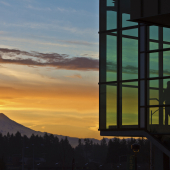A temperate and pleasant nation, Malta may be small, but it attracts people from all over the world, particularly to The University of Malta for those looking for a good education.
About Malta
Malta is a Southern European island country in the Mediterranean Sea. It is 80km south of Italy, 284km east of Tunisia and 333km north of Libya. It is one of the world’s smallest and most densely populated countries, being just over 316km2 and having a population of around 475,000.
Its capital is Valletta, the smallest capital in the European Union by area at 0.8km2. Its other largest regions include Birkirkara and Sliema. The official languages are Maltese and English, while Italian is also commonly spoken.
Many of the visitors to Malta are attracted by the vibrant nightlife, splendid beaches and lagoons, archaeological sites and beautiful harbour towns. Malta boasts three UNESCO World Heritage Sites: the historic capital city Valletta, the seven megalithic temples and the hypogeum (a prehistoric underground structure). Valletta is also preparing to take on the mantle of European Capital of Culture in 2018.
Malta is a member of both the European Union and the Commonwealth, and enjoys close ties with the UK. Formerly a British colony, Malta earned independence in 1974 and has used the Euro as its currency since 2008. It is a member of the European Higher Education Area. This means that undergraduate courses are free for EU students.
History, Culture, Customs
Malta has been inhabited since approximately 5900 BC. Its location in the centre of the Mediterranean has historically given it great strategic importance as a naval base, with a succession of powers having contested and ruled the islands, including the Phoenicians, Carthaginians, Romans, Byzantines, Arabs, Normans, Sicilians, Spanish, Knights of St. John, French, and British. Most of these foreign influences have left some sort of mark on the country's ancient culture.
Malta has a long Christian legacy and its Archdiocese is claimed to be an apostolic see because Paul the Apostle was shipwrecked on "Melita", according to Acts of the Apostles, which is now widely taken to be Malta. Catholicism is the official religion of Malta. Article 40 of the Constitution states that "all persons in Malta shall have full freedom of conscience and enjoy the free exercise of their respective mode of religious worship."
Malta is a popular tourist destination with its warm climate, numerous recreational areas, and architectural and historical monuments, including three UNESCO World Heritage Sites: Hypogeum of Ħal-Saflieni, Valletta, and seven megalithic temples which are some of the oldest free-standing structures in the world.
A 2010 Charities Aid Foundation study found that the Maltese were the most generous people in the world, with 83% contributing to charity.
During the summer, daytime temperatures are typically over 30oC and not usually lower than 15 degrees during the winter. Malta is truly Mediterranean and these temperatures are comparable to southern Italy or Greece.
Maltese food is similar to that of neighbouring island Sicily. Fresh fruit, vegetables, pasta and seafood are key ingredients. Traditional dishes include rabbit stew, fish pie, bragioli (stuffed beef), and bigilla (a thick bean dip). Popular for snacking are dishes like pastizzi (savoury pastries) and ħobż biż-żejt (traditional sourdough bread with olive oil, tomatoes and a mix of other toppings).
Malta is classified as an advanced economy together with 32 other countries according to the International Monetary Fund (IMF). In 1869, the opening of the Suez Canal gave Malta's economy a great boost, as there was a massive increase in the shipping which entered the port. Currently, Malta's major resources are limestone, a favourable geographic location and a productive labour force.
Film production is also a growing contributor to the Maltese economy. The first film shot in Malta was in 1925 (Sons of the Sea); over 100 feature films have been entirely or partially filmed in the country since then. Malta has served as a "double" for a wide variety of locations and historic periods including Ancient Greece, Ancient and Modern Rome, Iraq, the Middle East and many more.
The government is currently investing heavily in education, including college.
With its warm climate and fascinating history, Malta is a popular tourist destination- but does that make it a good place to study?
University System
Malta is actually home to only one true university, though several colleges are also available.
The University of Malta offers undergraduate bachelor's degrees, postgraduate master's degrees and postgraduate doctorates (PhDs). Established in 1769, though with a history that dates back to 1592, it now supports around 11,000 students including about 700 international students from over 70 countries around the world. The university’s main campus is in the harbour area of Msida, just to the west of Valletta. There’s also a smaller campus in Valletta and another on Gozo, the second largest of the Maltese islands.
The university has 14 faculties and a range of institutes and centres. Its libraries house a collection of nearly one million volumes.
The public university system in Malta also includes the Malta College of Arts, Science and Technology in Paola (just south of Valletta) and the Institute of Tourism Studies in St Julian’s (to the north-west). Along with the University of Malta, each of these participate in the EU’s Erasmus exchange program and the Bologna Process for compatibility of higher education across Europe. The official teaching language is English; though international students are also encouraged to learn Maltese.
There are also a number of private colleges and universities in Malta, one of which is an international branch campus opened by the UK’s Middlesex University, in the Pembroke area (again, just to the north-west of Valletta). Welcoming its first students in September 2013, the campus offers a selection of courses focusing on business and ICT.
For students who want to develop their English language level, Malta is also home to a large number of English language schools.
The University of Malta
The University of Malta traces its origins to the founding of the Collegium Melitense which was set up through direct papal intervention on 12 November 1592. This college was run by the Jesuits on the lines of their other colleges established elsewhere and known as 'Collegia Externorum', catering for non-Jesuit students. By a papal Bull of Pope Pius IV, dated 29 August 1561, confirmed later by a further Bull of Pope Gregory XIII, dated 9 May 1578, the Jesuits were empowered to confer the degrees of Magister Philosophiae and Doctor Divinitatis. However, the foundation deed specified that besides Philosophy and Theology, other subjects such as Grammar and the Humanities should also be taught.
Following the abatement of the plague of 1675, Grandmaster Nicolò Cotoner appointed Fra Dr Giuseppe Zammit as 'lettore' in Anatomy and Surgery at the Sacra Infermeria on 19 October 1676. This attempt at formalising medical teaching at the Order's hospital is considered by many as the beginning of The University of Malta’s medical school. Zammit went on to establish the first medical library on the island as well as a medicinal herb garden in one of the ditches of Fort Saint Elmo.
The university has fourteen faculties: Arts; Built Environment; Dental Surgery; Economics, Management & Accountancy; Education; Engineering; Health Sciences; Information & Communication Technology; Laws; Media & Knowledge Sciences; Medicine & Surgery; Science; Social Wellbeing and Theology.
Interdisciplinary institutes and centres have been set up. The institutes include Aerospace Technologies; Anglo-Italian Studies; Baroque Studies; Climate Change & Sustainable Development; Confucius; Digital Games; Earth Systems; the Edward de Bono Institute for the Design & Development of Thinking; European Studies; Islands & Small States; Linguistics; Maltese Studies; Mediterranean Academy of Diplomatic Studies; Mediterranean Institute; Physical Education & Sport; Public Administration & Management; Space Sciences & Astronomy; Sustainable Energy; Tourism, Travel & Culture.
The total floor area occupied by the (Main) University Library building, situated at the Msida Campus is between 5,000 and 6,000 square metres. A collection of nearly one million volumes is housed throughout the Main Library, Branches and Institutes. The University Library currently subscribes to over 60,000 e-journals, 196 print journal titles and 16,554 e-books.
Applications
The University accepts GCE Advanced and Advanced Subsidiary Level certificates, the International Baccalaureate, the American Advanced Placement System and the Advanced International Certificate of Education (AICE).
After selecting a course, applicants for undergraduate study may apply to courses throughout the year. However, applicants are advised to send their application to the Admissions and Records Office as early as possible. Online application is available and should be made by July in the year of admission.
Entry and Visa Regulations
Malta is a member of the Schengen Area, but students from within the EU, EEA or Switzerland require a visa to study in Malta for more than three months. Students from elsewhere require a visa irrespective of the duration of their stay.
After arrival and registration at the university, all international students who stay for more than three months (i.e. 90 days) should apply for a residence document.
At the time of first arrival, students should be in possession of a return air ticket to their country of origin, or its value in cash/bank draft, together with a bank statement indicating that they have sufficient funds to cover at least one year's tuition fees plus approximately €48 euro per day (€17,520 a year), which is calculated to be sufficient for one academic year's accommodation and living expenses.
Tuition Fees
Full-time undergraduate courses are free-of-charge to citizens of Malta and the EU. Maltese students enrolled in higher education in Malta are entitled to a stipend. Fees are charged in the case of higher courses and to students from non-EU states.
Fees are dependent on the course taken, and can be accessed via the University of Malta’s Course Finder.
Cost of Living
The cost of living in Malta is on the whole considerably lower than in neighbouring European countries. Below you can see an approximate guide of monthly expenses you are likely to incur living in Malta, but these will obviously be determined by your personal lifestyle.
|
Monthly Living Costs |
Euro (€) |
US Dollars ($) |
|
Accommodation |
500 |
589 |
|
Food |
250 |
294 |
|
Phone/Wi-Fi |
25 |
29 |
|
Local Transportation |
40 |
47 |
|
Books, Stationery etc. |
70 |
82 |
|
Leisure Activities |
170 |
200 |
|
Laundry |
20 |
24 |
|
Total |
1075 |
1265 |
Working
EU citizens (except for Croatia), member states of the European Economic Area (EEA) and citizens of Switzerland do not require employment licenses to work in Malta. Non-EU nationals are required to apply for an employment license if they wish to work in Malta. This is applied for by the employer, not the job seeker. The employer must be able to prove that no candidate from the EU, EEA, Switzerland nor a Maltese national is capable of fulfilling the vacancy.
Accommodation
Malta offers a variety of accommodation options for students, located around and close to the university campus, to suit different needs and budgets. Students are free to choose the lodging which suits them best.
Students registered for studies with the University of Malta may opt to live at the university residence or the Hotel Kappara. Both properties are administered by the university.
Health and Safety
Students from EU/EEA member states who are registered with the university are entitled to free treatment at Malta’s state-funded hospitals and health centres on production of an EHIC card. Students from non-EU/EEA member states are entitled to these services only in cases of emergency.
All non-EU/EEA international students are required to undertake medical health tests within 15 days of their arrival in Malta. This involves a chest x-ray.
Next Steps
If you think that you would enjoy studying in Malta, the first step would be to check the programmes offered by The University of Malta and see if any of them interest you.
If you find one that you like, consider financial planning and visa application. Sooner than you may think, you can be travelling to experience the beautiful delights of Malta, its impressive history, delicious food and of course its excellent educational opportunities.










